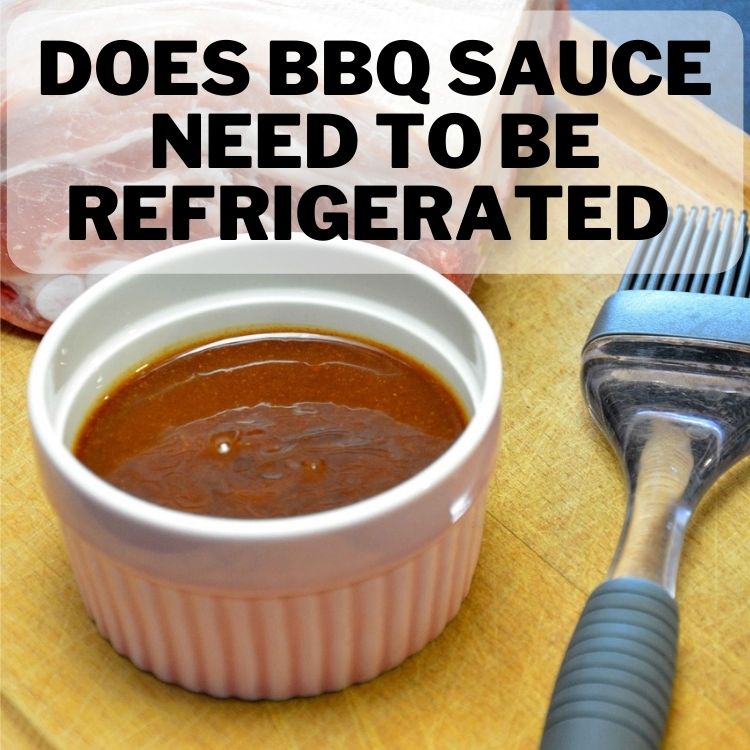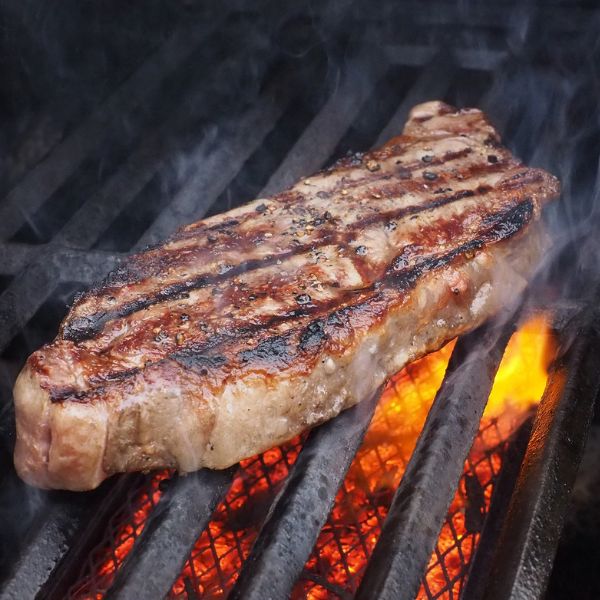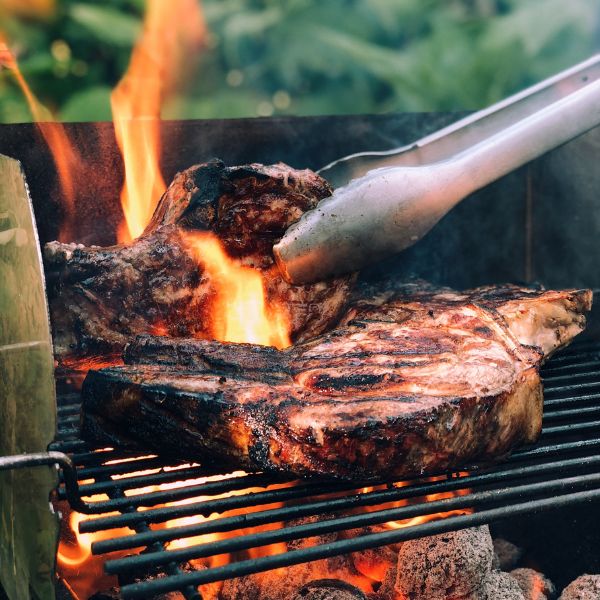In general, commercially produced BBQ sauces that are sold in stores do not need to be refrigerated until they are opened.
These sauces are typically made with preservatives and other ingredients that help to extend their shelf life.

However, once the bottle is opened, it is recommended to store it in the refrigerator to maintain its quality and prevent spoilage.
On the other hand, homemade BBQ sauces may require refrigeration even before opening.
This is because homemade sauces often contain fresh ingredients like tomatoes, onions, and garlic, which can spoil if left at room temperature for too long.
Refrigerating homemade or store-bought BBQ sauces helps to slow down the growth of bacteria and preserve its flavor.
It is important to note that not all BBQ sauces are created equal.
Some may have a higher vinegar or sugar content, which can act as natural preservatives.
These types of sauces may be able to withstand being stored at room temperature for longer periods without spoiling.
However, it is still recommended to refrigerate them to maintain their quality and flavor.
Additionally, the storage conditions can also affect the shelf life of BBQ sauce.
Exposure to heat, light, and air can cause the sauce to spoil more quickly.
Therefore, it is best to store BBQ sauce in a cool, dark place, such as the refrigerator, to ensure its longevity.
To further illustrate the importance of refrigeration, let’s consider an example.
Imagine you have a bottle of homemade BBQ sauce that contains fresh ingredients like tomatoes, onions, and spices.
If this sauce is left at room temperature for an extended period, the bacteria present in the ingredients can multiply rapidly, leading to spoilage.
Refrigerating the sauce slows down the growth of bacteria, preserving its freshness and flavor for a longer period.
Whether BBQ sauce needs to be refrigerated depends on its type and ingredients.
Commercially produced sauces can typically be stored at room temperature until opened, while homemade sauces should be refrigerated to prevent spoilage.
It is always best to err on the side of caution and refrigerate BBQ sauce to maintain its quality and extend its shelf life.
Remember to store it in a cool, dark place to ensure its longevity.
The Great BBQ Sauce Debate

The answer to whether BBQ sauce needs to be refrigerated depends on the type of BBQ sauce and its ingredients.
Most commercially produced BBQ sauces contain preservatives and high levels of vinegar or other acidic ingredients, which act as natural preservatives.
These ingredients help to inhibit the growth of bacteria and extend the shelf life of the sauce, even when stored at room temperature.
However, homemade or artisanal BBQ sauces may not contain the same preservatives or high levels of acidity.
In these cases, refrigeration is recommended to prevent the growth of bacteria and maintain the sauce’s quality.
Additionally, if the BBQ sauce contains perishable ingredients like fresh fruits or vegetables, refrigeration becomes even more crucial.
It’s important to note that refrigeration can alter the texture and flavor of BBQ sauce.
Cold temperatures can cause the sauce to thicken and become less pourable.
To restore the sauce’s original consistency, simply let it sit at room temperature for a while before using.
If you prefer a thicker BBQ sauce, refrigeration can actually enhance its texture.
To further illustrate the importance of refrigeration, let’s consider an example.
Imagine you’ve made a batch of homemade BBQ sauce using fresh tomatoes, onions, and garlic.
These ingredients are highly perishable and can spoil quickly when left at room temperature.
By refrigerating the sauce, you can ensure its safety and prolong its shelf life.
The debate on whether BBQ sauce needs to be refrigerated ultimately depends on the specific sauce and its ingredients.
While commercially produced BBQ sauces with preservatives and high acidity levels can be safely stored at room temperature, homemade or artisanal sauces may require refrigeration to maintain their quality and prevent spoilage.
It’s always best to check the label or recipe instructions for specific storage recommendations.
The Case for Refrigeration

The case for refrigeration of BBQ sauce is a topic that often sparks debate among food enthusiasts.
While some argue that BBQ sauce can be safely stored at room temperature, others firmly believe that refrigeration is necessary to maintain its quality and prevent bacterial growth.
So, does BBQ sauce really need to be refrigerated? To answer this question, it’s important to understand the ingredients and composition of BBQ sauce.
Most BBQ sauces contain a combination of vinegar, sugar, spices, and other flavorings.
These ingredients can create an environment that is conducive to bacterial growth if not properly stored.
Refrigerating BBQ sauce helps to slow down the growth of bacteria and extend its shelf life.
The cold temperature inhibits the growth of microorganisms, ensuring that the sauce remains safe to consume for a longer period.
Additionally, refrigeration helps to preserve the flavor and consistency of the sauce, preventing it from spoiling or becoming rancid.
One of the main concerns with leaving BBQ sauce at room temperature is the risk of spoilage.
Bacteria can multiply rapidly in warm environments, leading to foodborne illnesses.
By refrigerating BBQ sauce, you can significantly reduce the risk of bacterial contamination and ensure the safety of your sauce.
Furthermore, refrigeration can also enhance the flavor profile of BBQ sauce.
The cold temperature allows the flavors to meld together over time, resulting in a more complex and delicious sauce.
This is particularly true for homemade BBQ sauces that often contain fresh ingredients and require time for the flavors to develop.
To illustrate the importance of refrigeration, let’s consider an example.
Imagine you have a bottle of homemade BBQ sauce that you’ve left at room temperature for a week.
During this time, the sauce is exposed to fluctuating temperatures and potential contamination from airborne bacteria.
As a result, the sauce may start to develop an off-putting odor, lose its vibrant color, and even taste sour or spoiled.
On the other hand, if you had refrigerated the sauce, it would have remained fresh, flavorful, and safe to consume for a longer period.
While there may be differing opinions on whether BBQ sauce needs to be refrigerated, the case for refrigeration is strong.
Refrigerating BBQ sauce helps to maintain its quality, extend its shelf life, and prevent bacterial growth.
By storing your BBQ sauce in the refrigerator, you can ensure that it remains safe, flavorful, and ready to enhance
The Argument Against Refrigeration

One reason why some people argue against refrigerating BBQ sauce is because of its ingredients.
Most BBQ sauces contain vinegar, which is known for its ability to preserve food.
The high acidity of vinegar creates an environment that inhibits the growth of bacteria and other microorganisms.
Additionally, BBQ sauce often contains a significant amount of sugar, which also acts as a preservative.
The combination of vinegar and sugar creates an inhospitable environment for bacteria, making refrigeration unnecessary.
Furthermore, refrigerating BBQ sauce can actually alter its taste and texture.
Cold temperatures can cause the sauce to thicken and become less pourable.
This can make it difficult to spread evenly on meats or use as a dipping sauce.
By keeping BBQ sauce at room temperature, it maintains its desired consistency and is ready to be used immediately.
Another argument against refrigeration is the tradition and history of BBQ sauce.
Many BBQ enthusiasts argue that refrigeration is a modern practice that goes against the traditional methods of BBQ sauce preparation.
In the past, BBQ sauce was made in large batches and stored in jars or bottles at room temperature.
This allowed the flavors to meld and develop over time, resulting in a more complex and rich taste.
Refrigeration can disrupt this aging process and potentially diminish the flavor profile of the sauce.
To further support the argument against refrigeration, let’s consider the example of commercially produced BBQ sauces.
These sauces often have a long shelf life, even when stored at room temperature.
This is due to the addition of preservatives and other additives that help extend the sauce’s freshness.
If these sauces can remain safe and flavorful without refrigeration, it suggests that homemade BBQ sauces, which typically have fewer additives, can also be safely stored at room temperature.
The argument against refrigeration of BBQ sauce is based on the high acidity and sugar content of the sauce, which act as natural preservatives.
Refrigeration can alter the taste and texture of the sauce, and it goes against the traditional methods of BBQ sauce preparation.
Additionally, commercially produced BBQ sauces often have a long shelf life without refrigeration.
Finding the Middle Ground
Finding the Middle Ground When it comes to the question of whether BBQ sauce needs to be refrigerated, there seems to be a divide among barbecue enthusiasts.
On one hand, some argue that refrigeration is necessary to maintain the freshness and quality of the sauce.
On the other hand, there are those who believe that BBQ sauce can be safely stored at room temperature without any adverse effects.
So, where does the truth lie? Let’s explore the middle ground and find out.
While it is true that BBQ sauce contains ingredients like vinegar, tomatoes, and sugar, which are known for their ability to preserve food, it is still recommended to refrigerate the sauce after opening.
This is because BBQ sauce often contains other perishable ingredients such as onions, garlic, and spices, which can spoil if left at room temperature for an extended period.
Refrigeration helps to slow down the growth of bacteria and mold, ensuring that the sauce remains safe to consume for a longer duration.
However, it is important to note that not all BBQ sauces are created equal.
Some commercially produced sauces may contain preservatives or high levels of acidity, which can extend their shelf life even when stored at room temperature.
These sauces often come with specific instructions on whether refrigeration is necessary or not.
It is crucial to read the label and follow the manufacturer’s guidelines to ensure the sauce stays fresh and safe to consume.
Furthermore, the frequency of use also plays a role in determining whether refrigeration is necessary.
If you use BBQ sauce regularly and finish a bottle within a few weeks, refrigeration may not be as crucial.
However, if you only use it occasionally or have a large bottle that takes longer to finish, refrigeration becomes more important to maintain its quality.
To illustrate this point, let’s consider two scenarios.
In the first scenario, you have a small bottle of homemade BBQ sauce that you use frequently.
Since you finish the bottle within a month, you may choose to store it in a cool, dark pantry instead of the refrigerator.
The sauce remains fresh and flavorful, and you can enjoy it without any concerns.
In the second scenario, you have a large bottle of store-bought BBQ sauce that you only use occasionally.
In this case, refrigeration becomes essential to prevent spoilage.
By keeping the sauce chilled, you can ensure its longevity and avoid any potential health risks.
The Summary
The need for refrigeration largely depends on the ingredients and preservatives used in the BBQ sauce.
Homemade BBQ sauces that contain perishable ingredients like fresh fruits, vegetables, or dairy products should be refrigerated to prevent bacterial growth.
These ingredients can spoil quickly at room temperature, leading to foodborne illnesses if consumed.
On the other hand, commercially produced BBQ sauces often contain preservatives and stabilizers that allow them to be stored at room temperature.
These sauces undergo a pasteurization process that kills harmful bacteria and extends their shelf life.
However, it is still advisable to refrigerate opened bottles of commercially made BBQ sauce to maintain its flavor and quality for a longer period.
Furthermore, the consistency and texture of BBQ sauce can be affected by temperature changes.
When exposed to fluctuating temperatures, the sauce may separate or become watery, altering its taste and overall appeal.
Refrigeration helps to preserve the desired thickness and consistency of the sauce, ensuring a better culinary experience.
To illustrate, let’s consider an example.
Imagine you have a homemade BBQ sauce that contains fresh tomatoes, onions, and garlic.
Without refrigeration, the sauce may start to ferment and develop a sour taste within a few days.
However, if you refrigerate it, the sauce can last for up to two weeks, maintaining its freshness and flavors.
In summary, while refrigeration is not always necessary for BBQ sauce, it is generally recommended to prolong its shelf life and preserve its quality.
Homemade sauces with perishable ingredients should always be refrigerated, while commercially produced sauces can be stored at room temperature but benefit from refrigeration after opening.
By following these guidelines, you can enjoy delicious and safe BBQ sauce for an extended period.
When it comes to refrigerating BBQ sauce, the choice ultimately depends on your personal preference and usage.
If you want to be cautious and extend the sauce’s shelf life, refrigeration is recommended.
However, if you frequently use and finish a bottle quickly, storing it at room temperature should be perfectly fine.
Always remember to check the label for any specific storage instructions provided by the manufacturer.
So, the next time you’re unsure about refrigerating your BBQ sauce, consider the factors discussed here and make an informed decision.
Enjoy your delicious BBQ creations with peace of mind, knowing that your sauce is stored in the best way possible.
The question of whether BBQ sauce needs refrigeration has sparked a lively debate among BBQ enthusiasts.
While refrigeration can prevent bacterial growth and maintain flavor, it may not be necessary for everyone.
Ultimately, the decision comes down to personal preference and usage patterns.
So, go ahead and enjoy your BBQ sauce, whether it’s chilled or at room temperature.
Happy grilling!